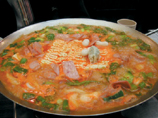 The first thing that made me come to Korea as an exchange student was a Korean drama called Jewel of the Palace. In this drama a lot of traditional and fantastic Korean food was introduced. In my opinion, “food" plays an important role that represents its national culture. “Food"is the main motivation for me to get involved in Korean culture as well.
The first thing that made me come to Korea as an exchange student was a Korean drama called Jewel of the Palace. In this drama a lot of traditional and fantastic Korean food was introduced. In my opinion, “food" plays an important role that represents its national culture. “Food"is the main motivation for me to get involved in Korean culture as well.Before coming to Korea, I was brought to a Korean restaurant where I had a hot pot soup. The soup I had was so incredibly tasty. However, the light in the restaurant was so gloomy that I barely recognized what the ingredients were inside the hot pot. The ingredients that I remembered were just rice cake and beef. I did not remember the location of the restaurant either. After that, every time I told my friends about the hot pot I once had, the way they looked at me seemed that I was telling a legend because no one had seen that kind of hot pot before. The myth was never solved until I came to Korea. When traveling to Seoul, a Korean friend introduced us to a hot pot called “budejjige," which means “army hot pot" if translated literally. As I spooned the budejjige soup into my mouth, I knew it was the mysterious hot pot that I had been looking for. I was so grateful that I found the mythic hot pot eventually. Also, I was told the story about "budejjige." After the Korean War, Korean people mixed sausage and ham, which were brought by the American military, with tofu, kimchi, meat, instant noodle, and some vegetables together in a hot pot. This combination of Western and Eastern hot pot soup, in my point of view, is so delicious that it should be a representative Korean food that every tourist must have.
As we know, kimchi is one of important and traditional foods for Korean people. However, before coming to Keimyung University, I had never expected that we would have kimchi as side dish every single meal in the cafeteria. Sometimes we do not have nappa cabbage kimchi, but there must be radish kimchi served instead. Students who live in the dormitories and have a meal plan cannot escape kimchi. One day when we were eating kimchi, one exchange student said that Korean people like to eat kimchi due to the Korean economic crisis in 1997. During the tragedy, people ate spicy kimchi to keep their strength in order to overcome the difficulties at that time. But this story was different from what I have heard. I heard that kimchi was produced because many vegetables were not easily cultivated during the severe winter. As a result, people made nappa cabbage or other vegetables into kimchi that could be kept longer. Also, spicy kimchi kept people warm in the frosty winter. After telling our kimchi stories, we asked Korean students which story was true. They just shook their heads. Nobody really knew why Korean people eat kimchi. Hence, the reason why kimchi became an essential side dish of Korean people's daily meals still remained unknown for me.
Because of a professor's request and my favor to food, I went to a tea ceremony that was held on campus. At the beginning, I thought it would be very boring because I imagined that there must be some experts who demonstrate the whole tea ceremony. All we could do was just sit down and watch. But I was wrong. All of us who participated in the tea ceremony had a chance to practice the tea-making performance. It was fascinating and I learned a lot from that. When I did the tea-making performance, I felt calm and peaceful. A professor who teaches the tea-making performance told us that the tea ceremony was related to Zen Buddhism. Therefore, while doing the performance, people feel that all the trifles which bother them are settled to the bottom of the world. Aside from learning the tea ritual, we also had some green tea, fruit, and rice cake during the tea ceremony. We all enjoyed this great afternoon tea time. And the tea ceremony ended with laughter and satisfaction.
In summary, food is a very important connection between me and Korean culture. By food I learn not merely knowledge about Korean history and religion but also some customs related to it. Thus, I will never give up the food journey during my short stay in Korea.








